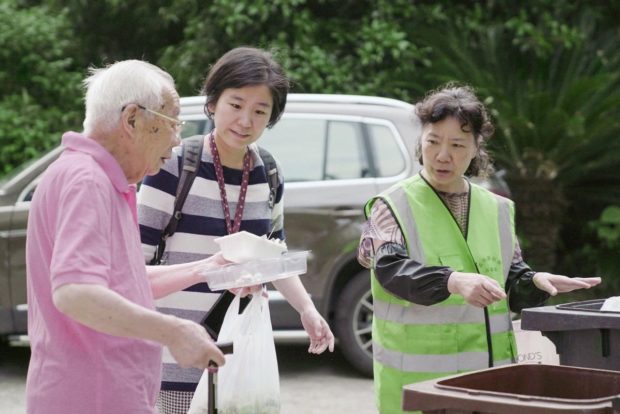Harvard grad carves out a career arranging rubbish

Zhou Chun (center) works with a local community worker to ensure the waste is correctly disposed of in Shanghai. China Daily/Asia News Network
SHANGHAI — While many people are still trying to get their heads around Shanghai’s new trash-sorting regulations that came into effect on July 1, Shanghai woman Zhou Chun was already well-acquainted with the practice.
After all, since October she has been running a company that deals precisely with this issue.
“Now, whenever I see a trash bin, I can’t help but check whether any garbage in it has been disposed of incorrectly. Trash sorting has already become a habit,” said Zhou, who has a master’s degree from Harvard.
Born in a small village near the Laogang landfill in Pudong district of Shanghai, Zhou spent her childhood in the 1990s playing near mud flats and slopes that were filled with garbage.
“In summer, the wind would blow the stench of the landfill into our home. Some trash trucks would also illegally dump garbage at our village,” Zhou said.
Article continues after this advertisement“When I was in fourth grade, I didn’t understand why the river running through our village suddenly turned black. I only knew that I wasn’t allowed to swim in it anymore,” she recalled.
Article continues after this advertisement“I later found out that this was caused by factories discharging sewage into the waters. But back then, the villagers, including my parents, thought that such a practice was normal. I even played with trash, collected it and burned it for fun.”
Zhou worked as a civil servant in Shanghai after getting a bachelor’s degree in Chinese literature from Fudan University. While working this job, she had the chance to embark on her first overseas trip to Tasmania, Australia.
There, when faced with pristine scenes of nature, she finally understood the magnitude of the pollution problem at home.
“It was in Tasmania where I learned that leaves should not be covered in dust, that the sky should be blue, that the water should be clear,” she said.
The trip sparked something within her, and she resigned from her job as soon as she returned, joining an environmental protection organization to protect bar-headed geese at the Qinghai-Tibet Plateau.
Two years later, in 2013, Zhou followed her husband to the United States, where he was accepted into Harvard Medical School. There, she continued to work at various nonprofit organizations.
Eager to learn more about how environmental protection organizations operate, Zhou applied for a master’s degree program at Harvard Kennedy School in 2015. In her application letter, Zhou expressed that she was determined to return to Shanghai after graduation to create an organization aimed at helping people live in an environmentally friendly way. She went on to study at the institution on a full scholarship.
Despite friends advising her to begin her career in the United States after graduation, Zhou made good on her promise and returned to Shanghai in 2016. However, she was sidetracked from her original plan and ended up doing business related to organic food. It was only when she attempted to sell her organic produce in a residential neighborhood in 2018 that she was reminded of her initial calling.
While chatting with the head of the neighborhood committee, she learned that in March that year the Shanghai municipal government released a plan to implement household waste sorting.
Sensing that this was a good business opportunity that aligned with her passion for the environment, Zhou started Zhuolian Environment Protection Technology Co in October, providing her clients – subdistrict and neighborhood committees – with solutions to how the trash-sorting program could be implemented.
Today, less than a year since its inception, Zhou’s company has eight full-time employees who run programs in 88 residential neighborhoods.
One of the first communities in the city that the company worked with was the West Kongjiang No 3 Community. Zhou said it was initially difficult to get residents to jump on the bandwagon.
“For some of the residents, garbage-sorting is too trivial a matter to put into practice,” she said. “Some of them even threw garbage at our volunteers.”
What encouraged her to soldier on was the support that community workers lent to the cause. Most of the volunteers were elderly people who painstakingly went from home to home to teach residents how to dispose of their garbage correctly.
The perseverance of everyone involved paid off quickly – over 70 percent of residents in the community were sorting their trash correctly by the end of that year. The trash-sorting measures also resulted in a 40 percent reduction in the amount of residual trash produced.
“The enforcement of the new regulation has raised the awareness of trash sorting among the public, which is very helpful for us,” Zhou said. “Now we can spend more energy on coordination and planning.”
“There is still a misconception that residents will sort their trash and dispose of it accordingly as long as the authorities limit the number of waste disposal stations and deploy people to supervise the process,” she added. “In truth, a lot of preparation, communication and training must be done beforehand.”